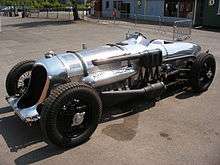Napier-Railton

The Napier-Railton is an aero-engined race car built in 1933, designed by Reid Railton to a commission by John Cobb, and built by Thomson & Taylor. It was driven by Cobb, mainly at the Brooklands race track where it holds the all-time lap record (143.44 mph (230.84 km/h)) which was set in 1935. This stands in perpetuity as the circuit was repurposed for military purposes during the second World War and was never used as a racing track again.
Between 1933 and 1937 the Napier-Railton broke 47 World speed records at Brooklands, Montlhéry and Bonneville Salt Flats in Utah.[1]
The car is powered by the high compression version (6.1:1) (RAF specification) of the naturally aspirated Napier Lion, a W12 of 23.944 litres (1,461 cu in) capacity, producing 580 brake horse power at 2585 revolutions per minute (recorded at 5, 000ft - performance at ground level may be different). The 12 cylinders are in three banks of four (broad-arrow configuration), hence the triple exhaust system, and the engine has standard aerospace features such as dual ignition (magneto type) . The non syncromesh crash gearbox (aptly named for the horrible noises caused by a mis-shift) has 3 ratios. The fuel tank, located in the boat-tail behind the driver, has a capacity of 65 gallons and fuel consumption was approximately 5 mpg. Although capable of 168 mph (270 km/h) the car has rear wheel braking only.[2]
Postwar owners include Patrick Lindsay and Victor Gauntlett but it was purchased by Brooklands Museum circa 1997 with the support of the UK's Heritage Lottery Fund and other donors. It is maintained in fully working order and normally on display in one of the museum's 1930s motoring sheds. The car is run regularly and is usually present at the Goodwood Revival motor race meeting every September.
 The Napier-Railton at Brooklands
The Napier-Railton at Brooklands The Napier-Railton at Brooklands
The Napier-Railton at Brooklands The Napier-Railton at Brooklands
The Napier-Railton at Brooklands Cockpit/Dash
Cockpit/Dash The Napier Lion engine
The Napier Lion engine- The Napier-Railton at Brooklands
Further reading
- Boddy, William (1966). The 1933 24-litre Napier-Railton. No. 28, Profile cars. Profile Publications.
- ↑ "Bonneville Salt Flats Motorsports multimedia exhibit". Marriott Library, University of Utah. External link in
|publisher=(help) (photo of the Napier-Railton at Bonneville) - ↑ Profile publications, Napier-Railton
External links
| Wikimedia Commons has media related to Napier-Railton. |
- Brooklands Society
- Brooklands Museum
- "Gallery of period photos of the Napier-Railton". Brooklands photo archive. External link in
|publisher=(help)